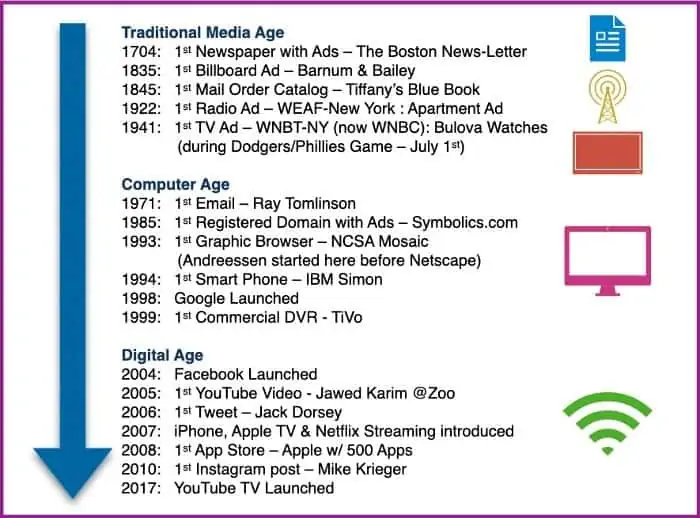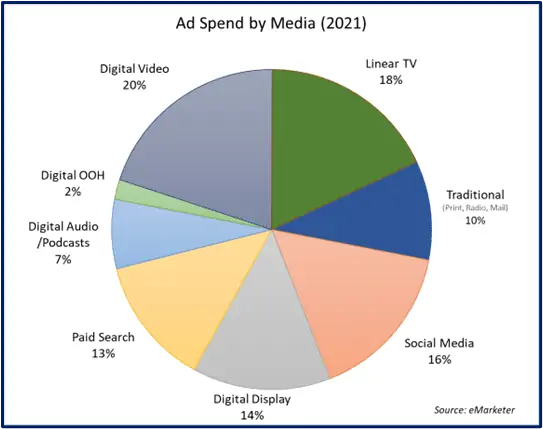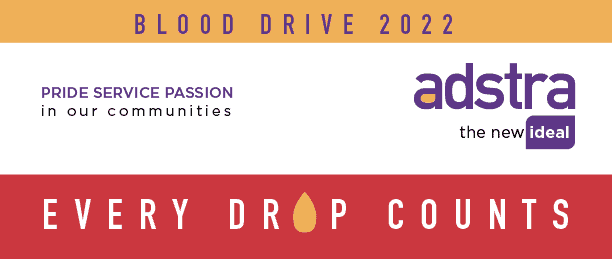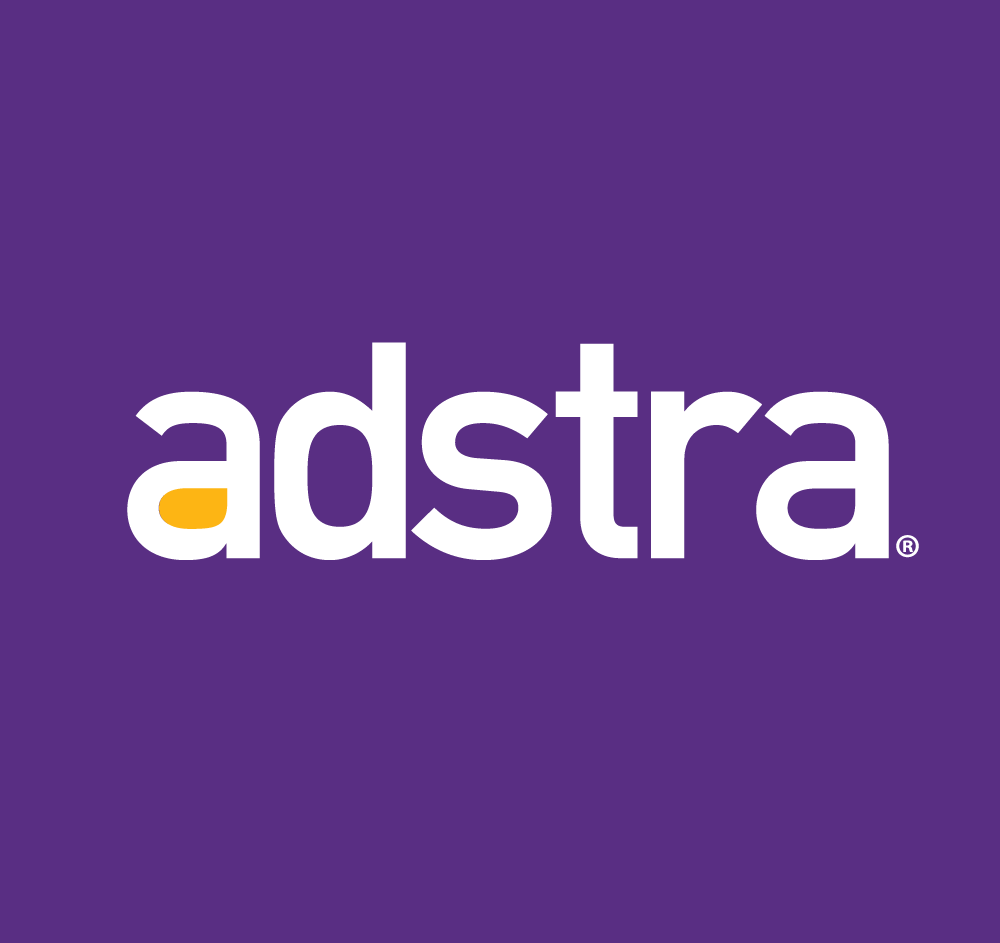“Nothing except the mint can make money without advertising.” – Thomas Babington Macauley
Summer 2022 Update:
In the 1952-53 season, I Love Lucy averaged a 67.3 rating. That means that 2 out of every 3 homes were tuned in to watch the antics of Lucy, Ricky, Ethel, and Fred. Compare that to the best-rated shows of today… NBC Sunday Night Football which has a 5.0 rating. The highest non-football related show, This is Us, pulling in at a 1.6 rating. We all are aware of the reason for this and the challenge it presents to advertisers. Consumers now have more choice in media than ever before, resulting in far more limited opportunities for advertisers to reach a mass audience in a single shot.
As we hit the tired and hot days of summer, we thought it would be fun to use this month’s update to share a brief timeline on the evolution of media here in the US, from the first advertising opportunity to the explosion of opportunities we now see in front of us. Change certainly started slow, but then people like Marc Andreessen and Steve Jobs got involved.
A Brief Media Option Timeline:

So where does this all lead us? As noted, to a huge amount of choice that we, as marketers, have to make on where we want to spend our ad dollars. Of late the answer has been to spread the wealth of ad spending everywhere. A breakdown of ad spending in 2021 by eMarketer shows that no single media channel has won out. We do know however that Advanced TV is certainly the fastest growing sector with spending increasing from a 13% share in 2020 to a 20% share in 2021. The goal is to try and find audience scale. There is no I Love Lucy anymore that is the easy answer. The other challenge, of course, is one of measurement. And given the choices, it becomes even more important to understand what media is performing better. We, for example, have tracked our performance across media and have found that digital audio is the hardest to make work. Our message is a complex one, and it requires a greater level of visual information to resonate with our potential customers. For the right audience and the right message, podcasts can be a great way to promote your brand, we still need to solve that media channel.

With the vast media choices, it also means that consumers themselves are moving around in the different media. It means that brands need to focus on creating consistent messages across media by the consumer segments they have identified. If you go too generic in your messaging, your differentiated value may be lost. Go too specific, and you risk varying the message across media. It’s why we here at Adstra have focused on solving the customer identity challenge. Having the right identity solution is key if brands want to create a consistent experience and track performance across media.
Privacy highlights:
The Senate Commerce Committee approved the Kids Online Safety Act and the Children and Teens Online Privacy Protection Act. “I appreciate all the work that has gone into the Children and Teens’ Online Privacy Protection Act but the need for a national law that protects everyone must be this committee’s priority. For that reason I cannot support this legislation today,” Senator Roger Wicker said. More than 110 organizations, led by the American Psychological Association, the American Academy of Pediatrics, Common Sense Media, and others, sent a letter prior to the hearing to encourage Committee members to support the bill.
The Washington Post explored the obstacles that Congress will face in reconciling the ADPPA and children’s privacy bills advanced by committees in each chamber. Asked if she plans to markup the House bill, Senator Cantwell said, “No. I don’t even think Nancy Pelosi has plans to bring it up, so pretty sure we are not going to be bringing it up.”
The Washington Post reported on Speaker Nancy Pelosi’s challenge in addressing calls for a House vote on the ADPPA in the face of opposition from California officials.
Senator Maria Cantwell repeated her opposition to the ADPPA in an interview with the Spokane Spokesman-Review. “The problem is it’s taking the House a long time to come to reality about what strong enforcement looks like,” Cantwell said. “If you’re charitable, you call it ignorance. If you think that it’s purposeful, it literally will not pass the House because they just won’t meet the test of what a strong federal bill looks like.”
The California Privacy Protection Agency Board voted unanimously to oppose the ADPPA and any bill that “similarly threatens crucial privacy protections for Californians.”
Roll Call considered the impact of concerns about government access to personal data on the broader data privacy debate in Congress.
An attorney with the Lawyers’ Committee for Civil Rights Under Law defended the ADPPA in an op-ed in the Los Angeles Times, focusing on its impact on civil rights and pushing back against concerns about its preemption of California’s privacy law.
The New York Times noted increased scrutiny of education software providers following a data breach at a company that provides schools with a product to track student progress.
A survey of more than 1,500 companies found that 91% were unprepared to fully comply with the CCPA and 94% were unprepared to fully comply with the GDPR.
Google said it will delay a plan to phase out third-party cookies on its Chrome browser until the second half of 2024.
We encourage you to also visit our content blog where you can get the latest news and thoughts on industry issues. While you are there, please also check out our website to gain a clearer understanding of Identity, Data, and all the services we have to offer.
Should you look for more help on these topics, please reach out and we would be happy to help. Email us at connect@adstradata.com
Articles of Interest:

Our insights are again only a small fraction of what is being shared out there. Here are some other interesting articles and opinions we thought to share to both inform and inspire discussion.
While not a real surprise to many, Google certainly made noise recently by announcing they were delaying the elimination of 3P cookies yet again. This time they are saying 2024, but who can be sure if it will ever happen?
Why Google’s cookie confusion is splitting the ad industry
As marketers embrace the rapid change of Advanced TV and the indications of an economic recession, nobody is quite certain on what is going to happen in the ad market in the second half of 2022. All the big tech players are expecting changes to revenue forecasts as they closely monitor brand behavior.
The Messy State of Digital Advertising
Not an article here, but rather a wealth of educational material that everyone should invest time with. A big thanks to Jeff Green and the team at The Trade Desk for putting all this material together to help us all understand the world of digital advertising and the importance of identity in execution.
With the recent overturning of Roe vs Wade, the importance of HIPPA protection laws are now even more important in providing guidance on how marketers should be thinking about health-related data. Does HIPPA apply to data-driven advertising though… the answer is yes… and no.
Concerns about Ads using Health Data are Rising
Positivity Press:

We can all use a little positivity and fun in life. Here are some of the recent items we wanted to share with everyone:
Inflation, Monkeypox, Midterm elections… still a great deal of stress-inducing factors in our world today. It continues to be important that we invest in the power of the positive. If we are mindful about how we take in the world, we can certainly enjoy it a lot more.
A Positive Outlook and Taking in the Good
There are a lot of fun days in August to celebrate. We can’t forget National Chocolate Chip Cookie Day (8/4), the end of the Dogs Days of Summer (8/11), and the start of Cat Nights (8/17). But the one day we certainly want to shine a light on is Women’s Equality Day… August 26th. The date the 19th Amendment was ratified back in 1920. Time for all of us to reflect and ensure that all of us have equality in all that we do and the opportunities we have.
While we shared this last month, we thought it worthy to share again, as we here at Adstra continue to make our push to get everyone involved in blood donation in some fashion. There are three different ways you can choose to help:

♥ Blood donations:
A single pint can provide red cells, platelets, and/or plasma, meaning a single donation can be used to save up to three lives. Do something amazing today – become a blood donor, be someone’s hero!
Check the blood donor eligibility requirements and pledge to give, here.
♥ Monetary donations:
Every drop and penny counts! We understand there are some who may not qualify or prefer not to give blood. Make an impact via Adstra’s American Red Cross Fundraiser. Donate here.
♥ Volunteer your Time and Talent at a local ARC blood drive.
Click here to sign up!
If you think others may be interested in getting a copy of this newsletter, please have them email us at connect@adstradata.com and we will add them to our list. You can also find copies of this and previous newsletters at Adstra’s website: adstradata.com
If you like what Adstra has to share or want to learn more about what we do, please visit our website at Adstradata.com or follow us on LinkedIn @Adstra, Twitter @Adstradata or Facebook @Adstradata. We welcome you to the new ideal.



